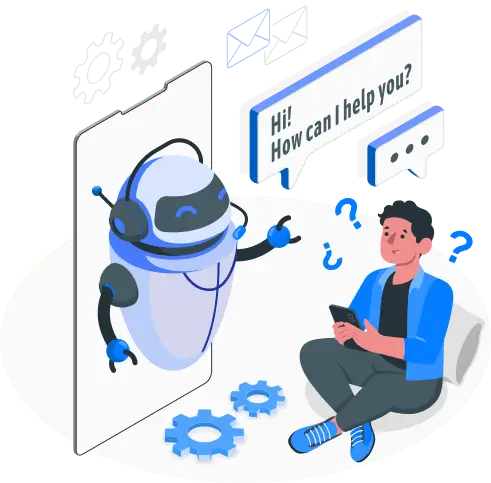Integrating Artificial Intelligence into Project Management
5 min read

Introduction
Project management requires constant adaptation to new technologies and methodologies. In recent years, Artificial Intelligence (AI) has emerged as a game-changer, promising to revolutionize the way projects are planned, executed, and monitored. AI-driven project management tools are helping organizations automate repetitive tasks, optimize resource allocation, and enhance decision-making processes. But how exactly does AI integrate into project management, and what are its real-world benefits?
As an AI-powered project management ally, Middleware provides real-time insights, automates workflows, and ensures data-driven decision-making—giving teams the competitive edge they need. The future of project management is AI-driven, and with Middleware, you’re already ahead of the curve.
The Role of AI in Project Management
AI in project management is not about replacing human managers; rather, it is about augmenting their capabilities. By leveraging machine learning, natural language processing (NLP), and predictive analytics, AI can enhance various aspects of project management, including:
1. Predictive Analytics for Risk Management
AI-powered tools analyze historical data and identify patterns to predict potential risks. By proactively addressing these risks, project managers can reduce delays and cost overruns. Platforms like Microsoft Project and Oracle Primavera use AI-driven insights to enhance risk assessment.
2. Task Automation and Workflow Optimization
AI can automate repetitive tasks such as scheduling meetings, sending reminders, and updating project statuses. Tools like Middleware, Trello and Asana integrate AI to streamline workflows, allowing project managers to focus on strategic decisions rather than administrative tasks.
3. Enhanced Resource Allocation
AI optimizes resource allocation by analyzing project requirements and employee performance metrics. By suggesting the best-suited team members for tasks, AI-driven tools improve efficiency and reduce burnout. ClickUp and Wrike offer AI-enhanced resource management features.
4. AI Chatbots for Real-Time Assistance

AI chatbots assist team members by answering queries, retrieving project updates, and suggesting best practices. Virtual assistants like Monday.com’s AI-powered bots help teams stay informed and aligned.
5. Intelligent Decision-Making

AI processes vast amounts of data and provides insights that help project managers make informed decisions. Predictive modeling allows managers to anticipate project challenges and adjust strategies accordingly.
Also read: How AI is Reshaping Software Development: Insights from the 2024 Dora Report
Benefits of AI in Project Management
1. Improved Accuracy
AI eliminates human biases and errors by relying on data-driven insights, leading to more precise project planning and execution.
2. Increased Productivity
By automating routine tasks, AI frees up time for project managers and team members to focus on complex problem-solving and innovation.
3. Cost Savings
AI-driven resource management reduces unnecessary expenditures by optimizing budgets and minimizing delays.
4. Better Collaboration
AI-powered collaboration tools enhance communication by ensuring that all stakeholders have access to real-time project updates.
5. Proactive Risk Mitigation
AI anticipates risks and provides solutions before they escalate, ensuring smoother project execution.
Also check out: Future-Proofing Projects: Integrating AI and ML into Agile Workflows
Challenges of AI Integration in Project Management
While AI offers numerous advantages, its integration into project management is not without challenges.
1. High Initial Investment
AI implementation requires significant investment in technology, training, and infrastructure, which may be a barrier for small businesses.
2. Resistance to Change
Many teams are reluctant to adopt AI-driven processes due to fear of job displacement or unfamiliarity with AI technologies.
3. Data Privacy and Security
AI relies on vast amounts of data, raising concerns about data security, compliance, and potential breaches.
4. Dependence on Quality Data
AI’s effectiveness is limited by the quality of data it processes. Poor data management can lead to inaccurate insights and flawed decision-making.
Also read: Open Source AI Tools for Business
Future Trends of AI in Project Management
As AI continues to evolve, its role in project management will expand. Some emerging trends include:
AI-Driven Predictive Scheduling: AI will enhance project scheduling by predicting the most efficient timelines based on past project data.
Autonomous Project Management Assistants: Virtual AI project managers may take on more responsibilities, such as resource allocation and task prioritization.
AI-Powered Agile Methodologies: AI will help refine Agile workflows by providing real-time feedback and adaptation strategies.
Greater Integration with IoT and Big Data: AI will leverage IoT sensors and big data analytics to optimize project execution, particularly in industries like construction and manufacturing.
Conclusion
Integrating AI into project management is no longer a futuristic concept—it is a reality that is reshaping how teams plan, execute, and monitor projects. With predictive analytics and intelligent automation, AI streamlines operations, boosts efficiency, and minimizes roadblocks. Of course, challenges like adoption costs, resistance to change, and data security concerns need addressing, but the benefits far outweigh the hurdles.
That’s where Middleware steps in. As an AI-powered project management ally, Middleware provides real-time insights, automates workflows, and ensures data-driven decision-making—giving teams the competitive edge they need. The future of project management is AI-driven, and with Middleware, you’re already ahead of the curve.
FAQs
How to integrate AI in project management?
Start by using AI-powered tools for task automation, predictive analytics, and resource optimization. Platforms like Middleware make integration seamless with real-time insights and workflow automation.
What is the role of artificial intelligence in project management?
AI enhances project management by automating repetitive tasks, predicting risks, optimizing resources, and providing data-driven insights for better decision-making.
What is an example of artificial intelligence in project management?
AI-driven tools like Middleware analyze project timelines, automate status updates, and predict potential delays, helping teams stay on track efficiently.
Is there an AI tool for project management?
Yes! Middleware is an AI-powered project management tool that automates workflows, offers smart recommendations, and keeps projects running smoothly with real-time insights.





